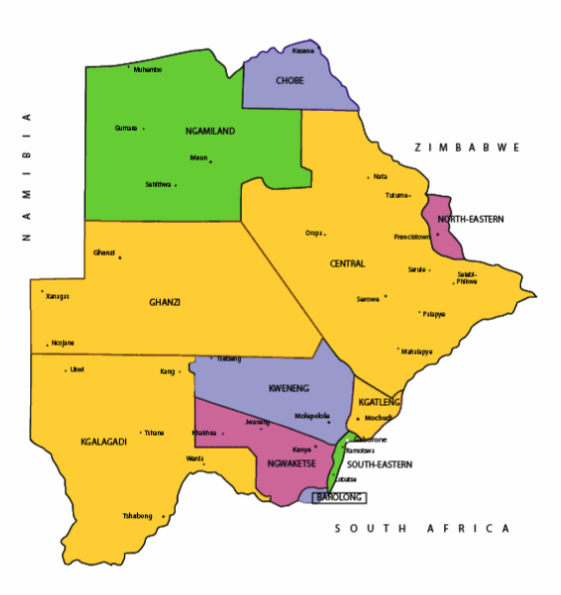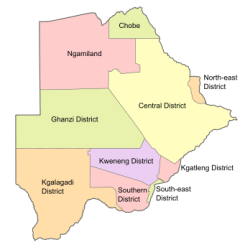Places and their polling stations in Kgalagadi South, Botswana
457 Bray
2136 Bray Primary School
2137 Boshoek Mobile Health Post
2138 34-Jm
2139 35-Jm
458 Werda
2140 Werda Primary School
2141 Tapologo JSS
2142 Eerstrust Borehole (Tent)
2143 Sam Mackenzie Primary School
2144 Cornwall
459 Kokotsha
2145 Kokotsha Primary School
2146 Houmoed
2147 UCCSA Church
460 Draaihoek-Makopong
2148 Bopaganang Primary School
2149 Legonono Kgotla (Tent)
2150 UCCSA (Makopong)
2151 Makopong Primary School
2152 Goa Borehole
461 Omaweneno-Kisa-Maralaleng
2153 Omaweneno Primary School
2154 UCCSA (Omaweneno)
2155 Kisa Primary School
2156 Maralaleng Primary School
2157 Megano Borehole (Tent)
2158 Kuwe Borehole (Tent)
462 Tsabong East
2159 Anglican Church
2160 Nhake Primary School
2161 Ikageng Ward Kgotla
2162 Roman Catholic Church
2163 Bontleng Ward Kgotla
463 Tsabong North
2164 Maleshe Primary School
2165 Tsabong Main Kgotla
2166 Seetelo Primary School
2167 Dutch Reformed Church
2168 Desalination Plant
464 Tsabong South
2169 Ikaneng Primary School
2170 Tsabong Unified Secondary School
2171 Lutheran Church
2172 Mccarthy’s Rust Primary School
2173 Logaganeng Kgotla
2296 Logonono Kgotla (Tent)
465 Bogogobo-Kolonkwaneng
2174 Kolonkwaneng Primary School
2175 Bogogobo Primary School
2176 Dekbos Drought Store
2177 Magading (Tent)
2178 Jordan Church (Kolonkwaneng)
466 Middlepits-Khuis
2179 Khuis Primary School
2180 Middlepits Primary School
2181 Lobu Field Station
2182 Kgolagano JSS
2183 Bodulong Ward (Khuis)
2184 Roman Catholic Church (Middlepits)
467 Gakhibane
2185 Gakhibane Primary School
2186 Diretsaneng Borehole
2187 Cheme
468 Khawa
2188 Khawa Primary School
2189 Kotswane Borehole
2190 Ikageng Ward (Khawa)
469 Vaalhoek-Rappelspan
2191 Rappelspan Primary School
2192 Vaalhoek Primary School
2193 Inversnaid
2194 Spaarwater
470 Bokspits-Struizendam
2195 Struizendam Primary School
2196 Tshanetshane Borehole (Tent)
2197 Geelpits (Tent)
2198 Bokspits Primary School
2199 Two Rivers
Reference: iec.gov.bw/index.php/electoral-districts/polling-stations.html
Botswana
Botswana is a country in Africa. It is topographically flat, with approximately 70 percent of its territory being the Kalahari Desert.
It is bordered by South Africa to the south and southeast, Namibia to the west and north, and Zimbabwe to the northeast.
Capital: Gaborone
Currency: Botswanan Pula
Official language: English
Population: 2.588 million (2021) World Bank
Dialing code: +267
Gross Domestic Product: 17.61 billion USD (2021) World Bank
Botswana’s ten districts are:
- Southern District
- South-East District
- Kweneng District
- Kgatleng District
- Central District
- North-East District
- Ngamiland District
- Kgalagadi District
- Chobe District
- Ghanzi District
Botswana’s councils created from urban or town councils are: Gaborone City, Francistown, Lobatse Town, Selebi-Phikwe Town, Jwaneng Town, Orapa Town and Sowa Township.






The name Botswana refers to ‘Land of the Tswana’. The landlocked, Southern Africa country is officially known as the Republic of Botswana.














Botswana is connected to Zambia through the Kazungula Bridge making it the world’s shortest border between two countries.
A country of slightly over 2 million people (2021), Botswana is one of the most sparsely populated countries in the world. It is essentially the nation state of the Tswana ethnic group, who make up 79% of the population.

About 11.6 per cent of the population lives in the capital and largest city, Gaborone.
Formerly one of the world’s poorest countries—with a GDP per capita of about US$70 per year in the late 1960s—it has since transformed itself into an upper-middle-income country, with one of the world’s fastest-growing economies.


The Tswana ethnic group were descended mainly from Bantu-speaking tribes who migrated southward of Africa to modern Botswana, living in tribal enclaves as farmers and herders.




In 1885, the British colonised the area and declared a protectorate under the name of Bechuanaland.
As colonisation stopped, Bechuanaland became an independent republic under its current name on 30 September 1966.


Since then, it has been a representative republic, with a consistent record of uninterrupted democratic elections and the lowest perceived corruption ranking in Africa since at least 1998.

The economy is dominated by mining and tourism. Botswana has a GDP (purchasing power parity) per capita of about $18,113 as of 2021, one of the highest in subsaharan Africa.


Botswana is the world’s biggest diamond producing country.
Its relatively high gross national income per capita gives the country a high standard of living and the third-highest Human Development Index of continental Sub-Saharan Africa (after Gabon and South Africa).
The country has been adversely affected by the HIV/AIDS epidemic. In 2002, Botswana began offering anti-retroviral drugs (ARVs) to help combat the epidemic.
Botswana is a member of the Southern African Customs Union, the Southern African Development Community, the Commonwealth of Nations, and the United Nations.

